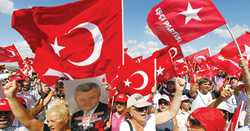At the end of March the Friends of Turkey, a group of 76 MEPs, together with TUSKON, a Turkish business confederation, held a seminar in the European Parliament with the aim of breaking stereotypes and building bridges between Turkey and the EU.

Earlier the same afternoon, the Turkey Assessment Group, an open forum for MEPs and their assistants, held its fifth meeting, addressed by Professor Binnaz Toprak on “Being different in Turkey”. Oddly enough, both meetings confirmed the stereotypes and demolished the bridges that the Friends of Turkey intended to build.
Contrary to Brussels opinion, the Turkey Assessment Group is not anti-Turkey, xenophobic and Islamophobe, but as the chairman, Morten Messerschmidt stated at the beginning of the meeting, “We are also friends of Turkey”. Perhaps the difference lies in the fact that criticism can be constructive and need not be branded as hostile. To correct another misconception: the Turkey Assessment Group’s meetings are hosted by the EFD Group in the European Parliament, which otherwise exercises no control over the content of the meetings or the selection of speakers. In fact, the aim of the Turkey Assessment Group is to act as an antidote to the views of the AKP government which have for a number of years predominated in Brussels.
Now the tide is turning. According to Barçın Yinanç, associate editor of Hürriyet Daily News, there are signs of an axis shift in the EU’s trust in Turkey’s ruling party. As Demir Murat Seyrek, a senior policy adviser for the European Foundation for Democracy, has pointed out: “There is an erosion of confidence in the AKP’s democratic rhetoric.” This was not evident at the Friends of Turkey seminar, which had more the character of a revival meeting than a sober analysis of the situation. However, a note of realism was struck by Andrew Duff, who called for a refoundation of the Turkey-European relationship and warned that if Prime Minister Erdogan put Cyprus before the European Union, he would be making a profound and historic strategic mistake.
The only criticism came from Binnaz Toprak, who as a guest complained that the term ‘Kemalist’ was now equated with that of ‘fascist’ in AKP Turkey. The next day Mrs Toprak got her comeuppance in the Islamist daily Zaman, which accused her of being delusional. Her offence consisted of heading a research group, which in December 2008 produced a report on “Being different in Turkey”. The purpose of their research was to examine the relationship between religion and conservatism in Anatolia but their most significant findings concerned the Gülen movement and its activities in connection with the increasing Islamization of Turkey. The Gülen movement, headed by Fethullah Gülen, a Turkish imam resident in Pennsylvania, is a $25 billion transnational organization with 1,000 schools in 115 countries around the world. According to STRATFOR it “provides the AKP with a social base, while the AKP provides the Gulenists with a political platform to push their agenda”. Its followers are entrenched in the government, public administration, education, the police, the judiciary, the media, business and even the military. TUSKON, which co-hosted the seminar together with the Friends of Turkey, is part of this movement.
As such, since the AKP government came to power in Turkey in 2002, it has become a force to reckon with. As journalist Ahmet Şık, who when he was arrested last month in connection with his unpublished book, “The Imam’s Army”, shouted: “Anybody who touches (Gülen) burns.”
Consequently, Fethullah Gülen has issued a statement that he has never been engaged in efforts to prevent the publication of a book, and that “Freedom of thought, expression and the press is a sine qua non for democracy.”
Nevertheless, it is widely perceived that the Ergenekon case, which was launched
in 2007 as a showdown with “the deep state”, has developed into a witch hunt against critics of the government and the Gülen movement. Take, for example, the arrest of İlhan Cihaner, Erzincan’s chief public prosecutor, after he began to investigate the activities of religious communities, and the arrest of former police chief Hanefi Avcı after he exposed the activities of Gulenists inside the police force.
Not to forget investigative journalist, Nedim Şener, a member of Binnaz Toprak’s team, who was arrested together with Ahmet Şık and also charged with being a member of the Ergenekon organization. Last year Nedim Şener was given the PEN Freedom of Expression Award and named World Press Freedom Hero by the International Press Institute.
Therefore it is not surprising that Prime Minister Erdoğan, who is averse to criticism and awkward questions, cancelled his visit to Brussels on 1 April.
The Turkey Assessment Group, which shares the European Parliament’s concern about the deterioration in freedom of the press in Turkey, has invited Haluk Şahin, Professor of Communications at Istanbul’s Bilgi University, to present the latest developments at its next meeting on 4 May. Accordingly, we hope that MEPs and their assistants from across the political spectrum will support our endeavours to throw light on this problem and attend the meeting.
Morten Messerschmidt, MEP, chairman, and Robert Ellis, advisor to the Turkey Assessment Group
via Breaking stereotypes in Brussels – New Europe.

Leave a Reply